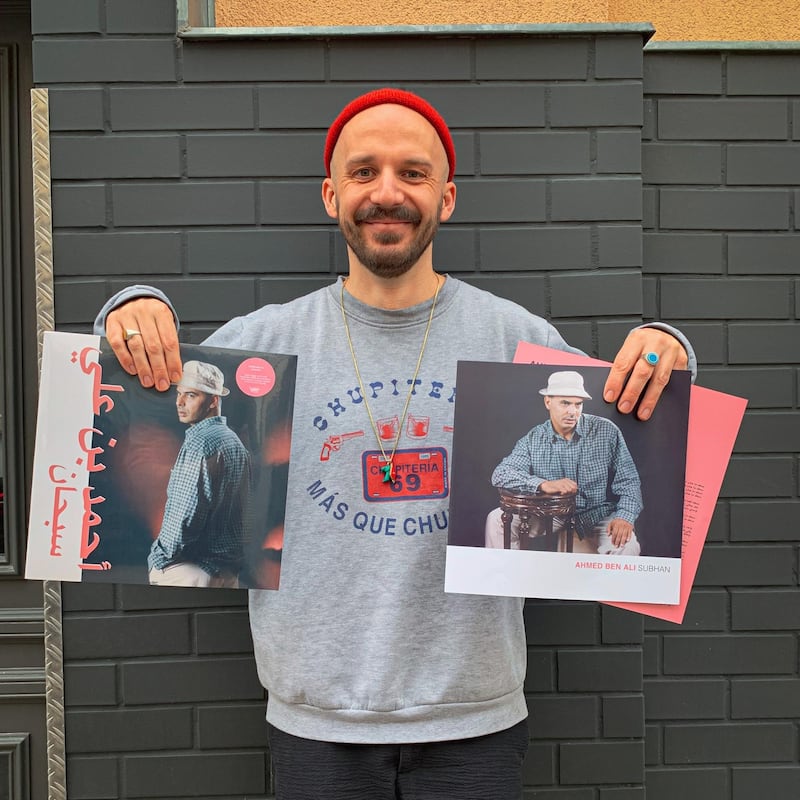For Jannis Sturtz, the question was not if but how to help Beirut.
The German DJ is head of Habibi Funk, a boutique label specialising in releasing rare and vintage tunes from the Mena region. He stared at the screen in horror earlier this month as he watched a city that has given him so much reduced to rubble.
"I called as many people as I know there," he tells The National of his first step after seeing the blast. "Fortunately, all of the people that I knew there personally, are safe. Then I started thinking about how I could help."
The idea came to him the following day over his morning coffee: he would contribute by doing what he does best. This meant releasing a collection of rare tunes by important yet scarcely remembered Lebanese artists, with all proceeds going to the Lebanese Red Cross.
Released 36 hours after the tragedy, Solidarity with Beirut is a vibrant 25-minute trip into the city's underground music scene of the 1970s and 1980s and features influential Lebanese artists such as Roger Fakhry and Munir Khauli.
The compilation serves as a short aural snapshot of an exciting time in Arabic pop, a period when Lebanese artists pushed boundaries, their compositions eschewing standard orchestral arrangements to include jazz, folk and Brazilian rhythms.
“Normally, when Habibi Funk works on a compilation, it is a longer process of research and curation and it can take nearly six months,” he explains. “Also, you have to factor in the paperwork with the artists as well for using the songs. With this small compilation, I am really happy with how it turned out because I wanted to put something out as quickly as we could to raise donations.”
This meant Sturtz contacting artists that were on his speed dial, so to speak.
“I basically reached out to the people I knew I had access to,” he says. “With the exception of Fakhry and Mounir, who live in the States and Paris, the rest are in Beirut and were thankfully far enough away from the explosion in that they only had their windows blown out.
“When I told them about the project, they were all interested in contributing.”
Songs address Beirut realities
Habibi Funk's compilations normally consist of unreleased material from the region (in the past he's unearthed Sudanese and Egyptian jazz and funk from the 1970s), but the seven tracks in Solidarity with Beirut have all been previously released, but are still hard to find.
“Technically they have been out, but it was done in the cassette scene where you would make 200 or so copies and distribute it among your friends,” Sturtz explains. “Also, a lot of these songs were written during the Lebanese Civil War [1975-1990], so many people have not heard them. You can’t find any of them on the internet, for example.”
Because of the contentious environment that surrounded the artists as they created many of these songs, the anguished lyrics about a then-shattered Beirut can ring depressingly true today.
One of these is Khauli's Heik ha Nishtghil?. Released in 1986, the song's description of a war-torn Beirut is reminiscent of the city's present dire economic reality. "Jobs are scarce, some folks clothed, some barefoot, the dollar rate is rising, where is this leading?" Khauli sings. "Violence and ferocity, senators and [parliamentary] seats, massacres and tragedies. Is this how we're gonna work?"
A counterpoint to Khauli's rage is Toufic Farroukh's Villies Invisible, an instrumental and jazzy ode to the city with all its mysteries and seductions.
An era of giants
What also makes this compilation gel is that all of the seven artists emerged from the same period in Lebanese music. It was an era of giants, with Fakhry and Khauli having performed with Fairuz. Meanwhile, Abboud Saadi, who contributed the lamenting civil war song Stand Up, has worked in the past with master composer Ziad Rahbani.
Despite some of the bleak lyrics, however, Solidarity with Beirut is ultimately a minor celebration of the city's music scene, which has been marked over the decades by its keen sense of adventure and its open-mindedness.
After all, it is Beirutis who first embraced Sturtz’s work in the region, inviting him for frequently over the years. “They have always been interested in the work that we as a label did,” he says.
“I mean, look, we are part of small, niche and nerdy scene. So our music is never going to reach hundreds of thousands of people, but whenever I go there and play, it’s great to see people who also enjoy the music.”
With the compilation generating awareness internationally, he plans to visit Beirut in the next few months.
“I just want to go there and catch up with friends and see if they are OK,” Sturtz says. “I don’t know how things will be over there in the next few months. When it comes to Beirut, making predictions is always super hard.”
Solidarity with Beirut is available on Bandcamp for €10 (Dh43.50)







